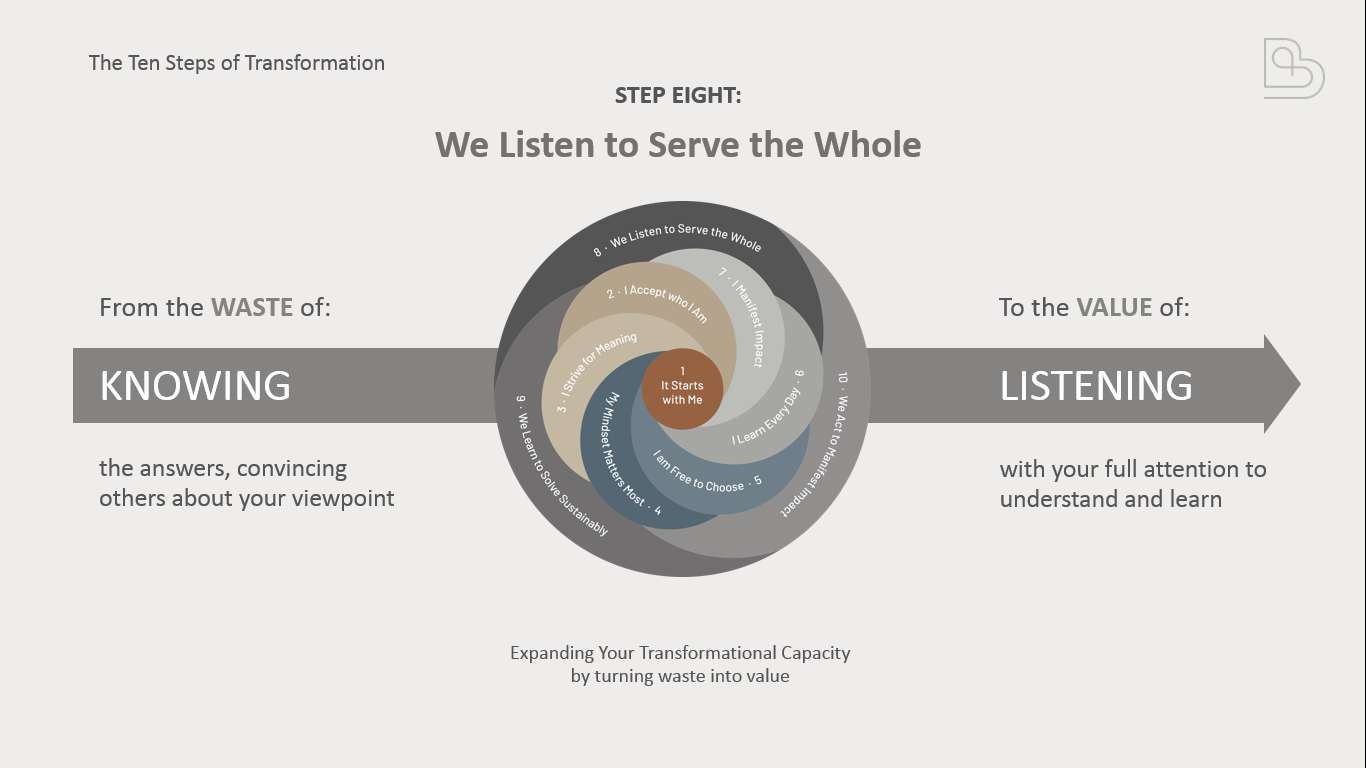6m
STEP EIGHT: We Listen to Serve the Whole – In Conversation with Simon Lamb
- Written by Karen Tobiasen
- November 6, 2020
- Personal transformation, TenSteps
6m
STEP EIGHT: We Listen to Serve the Whole – In Conversation with Simon Lamb
In a series of conversations with fellow transformers, leaders and influencers, we want to introduce you to the Ten Steps of Transformation. You’re getting a sneak peek into how The Heart Revolution can be your companion through transformation: helping you transforming your work and organization, by transforming yourself. You can always start with the latest, or catch-up from Step One.
For “Step Eight: We Listen to Serve the Whole”, I’m joined by Simon Lamb, facilitator, coach, and founder of Purposeful Change.
Step Eight: We Listen to Serve the Whole
|
What is Step Eight? Sometimes we listen from a place of protection – reacting to issues and jumping fast into fixing mode. We listen to people to reply and make our point, not to understand what is really going on. We can also listen with curiosity, listening actively to understand. We listen to what has happened in the past identifying what you want to build on for the future. We listen to apprehend the root causes of the challenges. The process of listening to understand requires us to pause, connect and reflect, slowing down before you speed up. Rather than providing answers, we ask questions that help us understand what is needed now To serve the whole – allowing the transformation to flow, flourish and function. |
Do you assume you know what is needed?
Simon’s philosophy of change and transformation is different to many consultants. Not because he thinks others are wrong, but because he thinks many have great points and the power likes in integrating and bringing together ideas from many people and places.
Looking back at his time in HSBC, Simon notes that he was perhaps too preoccupied with the top of the organization, focusing on the leadership and driving transformation through them. But researching social change, he saw it usually happens from the bottom-up – and at the same time he recognizes and acknowledges that organizations have hierarchy and structure. To many this would seem contradictory, perhaps even an irreconcilable tension, but to Simon this is exactly why we need to listen to the whole:
“Change actually happens top-down, middle-out and bottom-up – at the same time. We have to be igniting pockets of transformation and experimentation and evolution across the organization.”
But what does it really mean to listen to the whole? Simon points out that organizations can often forget they don’t have boundaries; that an organization is connected to the whole ecosystem they serve – so listening to the whole isn’t only about listening to the whole organization, but also the whole community, ecosystem and people surrounding the organization.
Simon brings to life the power of listening that sits at the heart of Step Eight, remembering an experiment he once did. Sending over thirty of his then-leadership team out of the office, he tasked them with speaking and meeting with people in the street for a few hours and report back what they’d learnt. It was an incredible moment – where leaders found answers to their own big questions of business transformation by having conversations with everyone from taxi drivers to those stuck in a passport office queue:
“The answers don’t lie within an individual. They lie somewhere in the middle of the collective … It lies between our truths. And if we can speak our truth and hold it lightly, and truly listen to the other perspectives, new perspectives emerge almost naturally.”
By truly listening to serve the whole, we’re able to make transformations so much easier. You don’t have to push the transformation, you can find and be powered by the pull that you discover by listening. And, as Simon highlights, this type of listening and data gathering isn’t just the precursor to your engagement and transformation, it actually is the engagement and the intervention. The way you show up in that first instance will impact the success of your work.

A recent example of the business impact of Step Eight can be seen in how one of Simon’s clients handled the COVID-19 crisis. The client’s initial, and very human, response to the crisis was to shut down – to focus on the numbers, to focus on protecting – and in that there was a lack of openness.
But within a couple of weeks, the client started asking their leaders and people: “What is needed right now? What value do we need to live more courageously in this moment?”
And a surprising answer came back: Development.
When everything they knew, and the authority and hierarchy the organization had been built on, was no longer true in the face of the pandemic, people and leaders needed to learn how to lead from not knowing. And that’s what the essence of Step Eight is actually about:
“Step Eight is all about listening from not knowing, not having expertise. It’s about giving up the idea of being right. About truly entering the space of compassion.”
On listening, the client threw out the rule book and pushed empowerment out to the frontline – to the people working with those directly affected by COVID-19. By listening, it became clear that their frontline people needed to be empowered, liberated, and allowed to adapt and make decisions in the moment. While there were of course mistakes made, it was clear that their people were able to learn, adapt, change, and made better decisions than had ever been imagined.
Simon leaves us with his advice for both experienced and newcomers to transformation:
“Explore, explore, explore: Challenge your own assumptions, go to the edges of the system – the places you least expect to find the answer, go out there and go listen.”
There are hidden gems to be found when we listen beyond the boundaries of our own organization and communities, when we stay curious and keep asking ‘why?’. As Simon says:
“Passionate non-attachment is the most vital skillset for a systemic explorer.”
It’s embracing and understanding what’s happening (and why), rather than immediately trying to fix or solve. Understanding that harmony has both the yin and the yang, so we need to embrace the difficult things as well. Embracing the fact that entropy is a reality in organizations and instead of playing it down, trying to listen to understand what causes it – you may even find the reason is a good one.
Many of our reactions, such as fear, are very human – we shouldn’t try to ignore it, but rather we need to listen to the whole and find a healthy response and course of action when facing it.
Where will you go to ask and listen for new perspective on your challenges?
If you enjoyed this post, please subscribe to this blog, and follow our Ten Steps of Transformation series.
You can also read more about the full Ten Steps of Transformation in The Heart Revolution book. Order you copy here
